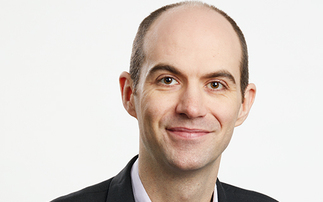Key points
At a glance:
- DB schemes are coping better than expected through the coronavirus
- Plenty of support is still needed to ensure DC schemes continue to deliver to members
- Long-term scheme sustainability is a key goal for the regulator
The Pensions Regulator is anxious to meet the industry’s expectations, but this latest challenge does not come with a manual. Hope William-Smith speaks to David Fairs.
It's nearly two years since David Fairs stepped away from more than two decades with KPMG to take the helm at The Pensions Regulator (TPR) as executive director for regulatory policy, analysis and advice. The role is a varied one which sees Fairs travel across the nation to communicate TPR's expectations to the regulated community, answer their concerns, and hear suggestions for future policy development.
What looked to be a busy second quarter of speaking events has "close to evaporated overnight" says Fairs, with the ongoing Covid-19 pandemic leaving the regulator with a host of new challenges to balance.
TPR is continuing to release a regular stream of guidance for pension schemes, trustees, and employers as many grapple with balancing commitments to members within difficult financial constraints caused my severe market dips.
Among this guidance has been calls from TPR for the regulated community to step up to making difficult decisions to ensure benefits are paid out and members not left stranded. The regulator has also published guidance on how employers can continue meeting their auto-enrolment duties, how schemes can maintain suitable governance standards, and how trustees can manage employer requests to suspend or reduce deficit recovery contributions as sponsors battle the economic turndown.
Aries Insight director Ian Neale said the regulator had left trustees "beleaguered and bewildered" amid a raft of criticism dating back to March, but Fairs is positive TPR is still pulling out all the stops.
With its continuing rollout of guidance, Fairs says the "strange sense of dislocation" that permeates the working from home lifestyle has not stopped TPR delivering on its commitments.
The regulator has yet to see any direct large-scale failures in either defined benefit (DB) or defined contribution (DC) schemes as a result of the pandemic, a success Fairs puts down to close work with other regulators, the Pension Protection Fund, the Money and Pensions Service (Maps) and the Department for Work and Pensions.
Fairs says: "In some ways it's early days but we talk to a large number of pension schemes - something like 123 pension schemes that were under one-to-one supervision - and the supervisors connected to those schemes have had conversations with each other's schemes around the challenges that they are facing, so that we also understand how they're bearing up under these market conditions.
"We're also talking to advisers around what they are seeing so we have a clear understanding of how the market is developing and, while we haven't seen any major issues come through to us yet, it may well be that we may have to be ready to deal with some of those at some point."
DB exceeding expectations
Fairs tells Professional Pensions that funding levels may not have dropped "quite as much as people anticipate" for DB schemes despite the challenging circumstances.
He says: "For many pension schemes that are reasonably well-matched in terms of their investment strategy, or have got good hedging strategies in place, the funding level may have dropped by potentially less than 5%.
"A lot of schemes are actually coming through this pretty well, and they are the ones who have looked at our guidance in the past and stuck to it well."
Having said that, Fairs adds he is aware that there are some schemes that do not have a matched investment strategy, or are not hedged to some of the risks, whose funding levels may have fallen by as much as 30%.
"There are some schemes that will have suffered quite significant changes," he says. "For those that have got sponsors with immediate financial challenges, we are providing easement on deficit contributions, in particular, while dialogue takes place between trustees and employers on the nature of those challenges and so that trustees can be fully informed on the nature of the difficulty."
The overall goal for the regulator is to see schemes being treated equitably compared to other parties.
Fairs says: "We wouldn't expect contributions to cease to pension schemes and dividends to continue, for example, so overall we are looking for trustees to make sure the scheme is being treated equitably, and to be informed about any financial pressures so they can make appropriate decisions in their circumstances."
TPR is expecting trustees to decide on this based on guidance already provided, Fairs says, adding the regulator welcomes contact from any DB scheme struggling if they need further support.
When it comes to short-term financial difficulties for employers as the pandemic continues, Fairs says the regulator "has tried already to be very clear with guidance to trustees and employers" on the importance of employers' clear communications where trustees are being asked to agree to a short-term reduction in deficit contributions or cessation of contributions.
Fairs says: "This is so that trustees have got full information of the position of the sponsor, why they need to take those actions, and what the future might hold as things return to normal.
"We are expecting a good flow of information and we wouldn't want a pension scheme to agree to a reduction in deficit contributions just for the benefit of the banks providing loan facilities, or for dividends to flow through to other shareholders."
He confirms TPR is looking at short-term easements but adds that "ultimately DB schemes do need to be properly funded" to ensure members get the benefits they are expecting. "It is a case of balancing those short-term needs with the long-term interests of members," he adds.
Schemes undertaking valuations this year can expect further guidance in the regulator's annual funding statement.
Fairs says the main challenge for DB schemes is the uncertainty of when this situation will come to an end. "What that means in terms of markets and that has two aspects to it - one in terms of how should they measure liabilities such as what discount should they use in their actuarial valuations to assess the value of the liabilities particularly if we're in a situation where returns in gilts and fixed interest are low for a considerable period of time," he says.
On the assets side, Fairs says it is more a case of deciphering what the length of the pandemic means for wider asset returns and returns on UK and international equities once lockdown measures lift and allow economies to normalise.
Regulating consistently
Position: David Fairs is executive director for regulatory policy, analysis and advice at The Pensions Regulator, a position he has held since July 2018. He is also chairman of the pensions working group of the Joint Forum for Actuarial Regulation, and an advisory board member for the Association for Business Psychologists and the University of Essex's department of mathematics.
Previously: Fairs was at KPMG for 23 years, having also previously worked for Aon Consulting. He was chairman of the Association of Consulting Actuaries between 2014 and 2016, and is also a past chairman of the Actuaries Club and the Joint Industry Forum for Workplace Pensions.
He says: "Particularly for DB schemes it's a question of what this means for the sponsor - it's very clear that some sponsors have been very badly impacted by the situation we are in.
"We are looking at trying to make sure that the guidance we put out is appropriate and will really help trustees and employees through this difficult time."
What has happened to sponsor covenants during the crisis also remains to be seen once markets are able to function as normal - perhaps the most immediate concern for DB schemes.
Fairs says: "It's all in how we move out of the current situation and the extent to which the economy recovers and the particular nature of each business which is something we are thinking about very carefully."
He confirms TPR's funding statement is set for release end of this month or the beginning of May and will help DB schemes pave a clearer path for action.
"Schemes that have had 2019 valuations who are in the process of completing those valuations have been set out some guidance, not to fundamentally change the assumptions that they are using for their valuations, but to look at the covenant strength of their sponsoring employer, see how that's changing and to think about what that might mean in terms of future contributions, and deficit contributions," Fairs says.
"We recognise that's quite a challenge which is why we have given schemes the additional three months in which to finish off their valuation before we would take any action against them."
A new era for DC
Fairs adds the "overall push" behind the regulator's guidance throughout Covid-19 is simple with contributions that are paid over to pension schemes during the pandemic "potentially particularly valuable" if markets recover. "We are not providing any easement on employers contributing AE to pension schemes. We're strongly encouraging members to stay in schemes, and to keep paying contributions in," he says.
"We are trying to signal strong encouragement to people to keep going and keep saving. We are strongly encouraging people making life-changing decisions at this time to think really carefully about those decisions to make sure they don't regret them going forward."
The increase in scam activity that coronavirus engenders is also keeping regulator staff occupied.
Fairs says: "Sadly we've seen people trying to take advantage of the current uncertainty and entice members to move their funds to what scammers claim to be a safer place and of course members lose their life savings in that."
He adds the regulator is looking to employers and trustees to support members in those decisions, both in terms of whether to consider saving, whether to make decisions around retirement and take their benefits and also if they are looking to transfer.
"We recognise that there are operationally difficult circumstances and we have seen some particular schemes with quite marked increases in transfer value activity. In part that may be just the uncertainty of the current times, but it could be an increase in scam activity or a combination of the two," he adds.
Fairs states the most delicate part of the Covid-19 jigsaw for the regulator is rendering short-term assistance at a difficult time while making sure member benefits are protected over the long term.
"It's a very difficult task to balance those two things, so in the DC world we have provided the easement for those companies that are having to furlough employees to reduce contributions down to the AE minimum in order that that doesn't place undue financial burden on those companies," he says.
Under the furlough scheme the proportion of wages is paid, but also the employer AE minimum contributions. To date the regulator has not provided easement for employers who are not furloughing staff or do not have any furloughed staff.
Fairs confirms: "We are expecting them to go through the 60-day consultation if they want to make changes to contributions and that goes to the heart of the challenge that we think is really important; where it's possible to continue paying contributions they can continue to be paid so that people's future retirement isn't impacted."
"We're having to balance those judgements between the fact that we want people to continue saving for retirement against those financial pressures."
Fairs adds the situation "is exactly the same" with DB schemes: "Clearly if trustees are agreeing to a short-term suspension of deficit contributions, in the short-term that's not going to help in terms of the funding of the DB scheme, but if we can - by providing that easement - ensure that the businesses that were otherwise profitable and sustainable can get through these difficult conditions once things return to normal then that's clearly a good thing," he says.
"This is us finding ways to help companies to get them through this position without jeopardising the security and promised benefits of members in the future."
Operational lifelines
While the regulator is not formally offering flexibilities to DC schemes not using the government's furlough scheme, operational easements are being introduced where possible.
Fairs says there are "a number of different aspects" to the help available and says these schemes are being asked to prioritise timely deduction and investment of contributions. "Doing so could be quite critical at the moment in terms of the overall benefits that come to members," he adds.
The regulator is providing easement in these cases in terms of the operational aspects. "Say in a situation where they have to get information from third parties or complete audit accounts, we are trying to provide easement and help schemes to think about what their priorities really are," Fairs says.
He adds that TPR is considerate that some administrators are "potentially less well geared up" for remote working than others, particularly where they have outsourced providers in other countries.
Fairs says: "We know provision of those services can be quite stressful so we are asking schemes to understand those things and do the best they can, and we will take a proportionate response to them."
The regulator is also keeping in close dialogue with master trusts around potential operational difficulties following the restructure of the market last year, along with financial impacts on the schemes relating directly to coronavirus.
Fairs says: "We're asking those schemes and employers to support and help employees through encouraging them to continue saving if they've still got a long period ahead before retirement to help members make decisions if they are faced with decisions which are quite critical."
The regulator is currently asking master trusts to point members to Maps for impartial advice.
The new face of TPR
Operational systems at the regulator have held up in the weeks its staff have been working at home, testament to TPR's well-tested business continuity plans, says Fairs.
"We are quite fortunate as an organisation that we tested those on a regular basis, although that's not to say we could have envisaged we would ever been a circumstance like this pandemic," he says.
Fairs reveals staff at the regulator are continuing "remarkable well" following the move to full remote working "pretty much overnight" in March.
"The executive team and board are incredibly proud at how TPR has reacted to these difficult circumstances," he says.
Staff at the regulator with carer responsibilities and children who are unable to go to school are also being given flexible arrangements.
Fairs says: "We have had to make changes to working patterns and alter HR policies to ensure that people can do what they need to do at the same time as delivering services to TPR."
"We've taken a lot of care to make sure our employees are well and that their mental wellbeing is being catered for and we are supporting all staff as much as we can in this very different working condition."
The regulator is also prioritising new activities - it has extended the consultation time on the DB funding code and will refrain from announcing new consultations in order to reduce the burden on respondents.
"We have prioritised the activities we think are most important and I am pleased to say we are fully functioning and coping well," Fairs says. "In this very different world, it's a testament to the robust plans we had in place before the pandemic happened."
Guidance from the kitchen
Like his staff and most workers around the nation, Fairs has been establishing a more permanent working from home space in the last month. For Fairs it is the kitchen, a new and "slightly odd experience" from where he is speaking to upwards of 400 people at a time.
"The really strange thing is when you stand on a stage and you talk to an audience, you can see their faces and you can see whether they're interested and whether they agree or disagree with what you're saying," he says. "The problem with a lot of technology is when I'm just sitting in the kitchen, you can't see what these people are thinking."
"A lot of my time is spent liaising with stakeholders, speaking at conferences to explain our thinking and answer questions and having just launched our consultation on the new funding code, I had a diary full of commitments planned to speak at many conferences.
He adds: "There's been a bit of a lull but I think now everybody is getting used to being isolated and so the technologies to connect with other people through webinars and so on have really come to life.
"Everyone is in the same position though, having to get used to webinars and online communication as the new fulltime norm until we can be face to face once again."








